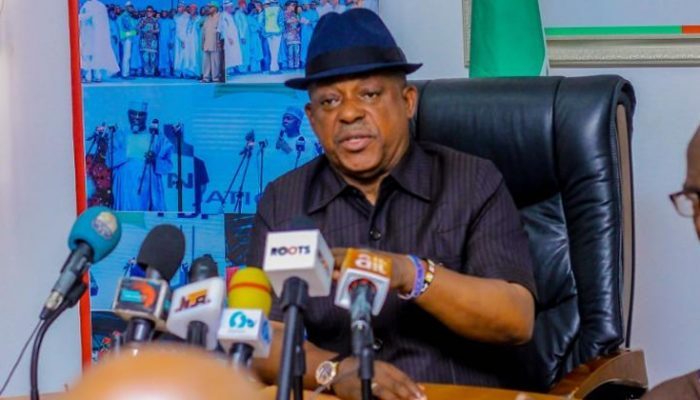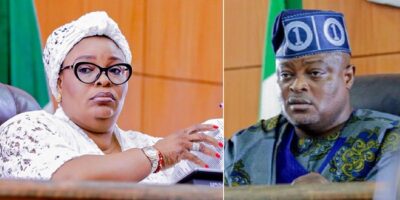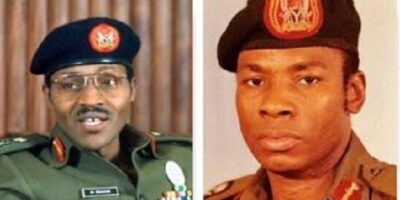PDP Questions Supreme Court Over Imo Governorship Election Verdict, Calls For CJN’s Resignation

The Peoples Democratic Party (PDP) has described the verdict of the Supreme Court on the Imo governorship election as a judicial coup and called for the Chief Justice of Nigeria, Muhammad Tanko, to resign.
Also, PDP is demanding a judicial review and reversal of the Supreme Court verdict.
The Peoples Democratic Party’s National Chairman, Prince Uche Secondus, in a press conference after an emergency meeting of the NWC relayed the party’s position to the general public.
He accused the justices of the Supreme Court who delivered the controversial judgment that sacked Emeka Ihedioha of the Peoples Democratic Party, PDP, as governor of Imo State and enthroned Senator Hope Uzodinma of the All Progressives Congress, APC, of corruption and lacking in credibility.
The party said that Justice Tanko must resign from his post.
In the light of extraordinary circumstances that vitiates that judgment as a product manipulation and a clear coup d’état against the will of the people of Imo State, we demand that the decision of the Supreme Court on the Imo Governorship Election be reviewed and reversed in the interest of justice.
Furthermore we demand that Justice Tanko Mohammed, the CJN and his colleagues on the Imo Governorship Panel recuse themselves from the remaining cases involving PDP in the Supreme Court.
We state for the records that the Supreme Court under Justice Tanko Mohammed shall be held responsible if there is any breakdown of law and order in any state as a result of judgments procured solely for political rather than judicial reasons as is currently happening…
The Supreme Court, in a host of cases, the latest and most celebrated being Atiku V Buhari & Ors, consistently decided that for a petitioner to succeed in an allegation of infraction of any provision of the Electoral Act especially one complaining about malpractice, as in this case, wrongful exclusion of votes, the petitioner must call witnesses polling unit by polling unit.
The question is, how many witnesses did Uzodinma/APC call from the 388 polling units from where the Supreme Court allocated votes to him.
The so called results from the 388 Polling units were rightfully rejected, in line with several decisions of the Supreme Court, by the Tribunal and Court of Appeal as it was merely dumped on the tribunal in a Ghana Must Go bag, by a policeman who had no mandate of the police to testify at the Tribunal.
It is one of the great wonders of the world how the Supreme Court opened the bag, counted the results and added them to only the APC Candidate,” he said.
What is more perplexing is the fact that INEC produced a schedule of reasons why results were not produced from the 388 units.
Indeed election did not even take place in most of the units for one reason or another, like violence, etc and so no result could possibly be obtained from those units. The results were not merely rejected or cancelled by INEC.
None of the candidates or their Counsel, except perhaps APC, as we speak, are aware of the number of votes scored by each party from the 388 polling units. The Tribunal or Court of Appeal did not mention or ascribe any figure from the units to any party in their decisions.
In fact, in the cross examination of the APC Candidate, Sen. Hope Uzodinma, he could not read any figure from the “Oluwole” results. He said that the figures were not clear. And so it beats our imagination where the Supreme Court conjured and manufactured the figures it used in declaring Uzodinma/APC as duly elected.
Does the Supreme Court have powers to formulate and allocate votes as election results?
Were the said results certified by INEC as required by law? Did Hope Uzodinma call 388 witnesses from the 388 polling units to speak to the results to obviate the principle of dumping which the Supreme Court used against the PDP and her candidate, Atiku Abubakar, in the last Presidential Appeal.
Were the presiding officers and or party agents of the 388 polling units called to testify by Uzodinma/APC, who were the Petitioners?
What are the figures from each of the various 388 polling units generated and allocated to Hope Uzodinma/APC by the Supreme Court?
Is the Supreme Court saying that all the votes from the alleged 388 polling units were for the APC alone in an election that was contested by over 70 candidates?
It is on record that the votes analysis from the Imo governorship election as at March 11, 2019 when the results were declared were as follows: -Total Accredited Votes: 823,743
-Total Valid Votes: 739,485
-Cancelled Votes: 25, 130
-Total Valid Votes: 714,355. But at the Supreme Court the Total Valid Votes have increased to 950,952.
This accounts for 127,209 votes in excess of Total Accredited Votes of 823,743”, Secondus said.
Can the Supreme Court sit in Abuja on January 14, 2020 to increase the total number of accredited votes in election held in Imo State on March 9, 2019.
Is there any law, which permits the Supreme Court or anyone else for that matter, to unilaterally increase the total accredited votes by any margin after the accreditation and or the election?
Where did the Supreme Court get the numbers to declare Uzodinma/APC from a paltry 96,456 votes over Ihedioha/PDP votes of 276,404?
He argued that even if all the excess accredited votes of 127,209 manufactured by the Supreme Court were added to Uzodinma/APC, it will be 223,657 votes, still less than the dethroned PDP man’s votes of 276,494 by 42,747 votes.
It is important to also bring to the consciousness of well-meaning members of the public, particularly Nigerians, that there were two elections on March 9, 2019, namely, Governorship and the House of Assembly.
As already known, there was only one accreditation for the 2 elections. The APC did not win any of the 27 seats in the Imo State House of Assembly which were won as follows:
PDP won 13
AA won 8
APGA won 6
APC won 0
Total 27
The above further questions and confronts the rationale for the judgment of the Supreme Court on Imo State.
How then did the Supreme Court arrive at its decision to allocate results to void a lawful governorship election and imposed an unelected person as governor?
If the people no longer repose confidence in the Supreme Court, then our democracy, national cohesion and stability are at great risk.
The constitution of the panel that heard the appeal itself was a product of drama.
But can any judge who sat on that panel go home and sleep well?
Can any judge who sat on that panel face his creator and swear that impartial justice was done? We think not.
Can the PDP rightly trust the impartiality and independence of the panel headed by Justice Tanko Mohammed, the CJN, to adjudicate on the remaining cases involving the PDP like Kano, Sokoto, Benue, Bauchi, Adamawa, Plateau and others?
Is the same fate awaiting the Governors of these states that are controlled by the PDP and other states like Kano where the PDP clearly won and was robbed?
Should Justice Tanko Mohammed and his colleagues on the Imo Governorship Panel not recuse themselves from the remaining cases involving PDP?”
Our party has it on good authority that Justice Tanko and his panel are working on instruction from certain forces in the Presidency to use the Supreme Court to take over states lawfully won by the PDP and award them to the APC.
The PDP therefore advises Justice Tanko not to allow himself to be used to push our nation to the path of anarchy and constitutional crisis as any further attempt to subvert justice in the pending petitions on Sokoto, Bauchi, Benue, Adamawa as well as Kano and Plateau states will be firmly and vehemently resisted.
In order to avoid an imminent breakdown of law and order, the PDP demands that Justice Tanko Mohammed immediately steps down as CJN and chairman of the National Judicial Council as Nigerians have lost confidence in him and a Supreme Court under his leadership.
Justice Tanko must not head the panel to determine the remaining election petitions before the Supreme Court.

Justin Nwosu is the founder and publisher of Flavision. His core interest is in writing unbiased news about Nigeria in particular and Africa in general. He’s a strong adherent of investigative journalism, with a bent on exposing corruption, abuse of power and societal ills.













